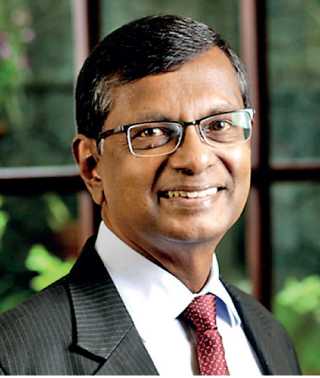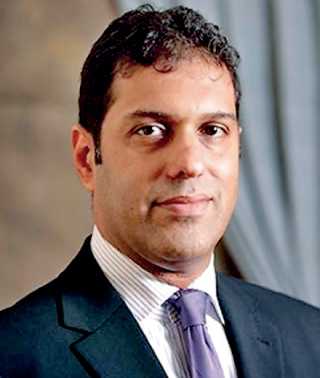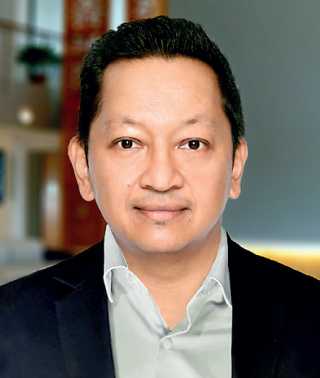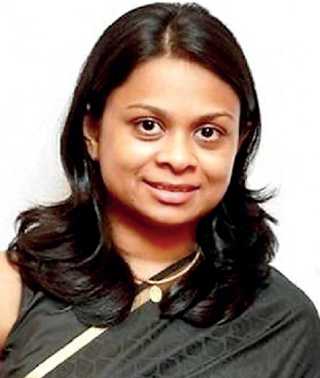Thursday Feb 19, 2026
Thursday Feb 19, 2026
Monday, 14 December 2020 00:00 - - {{hitsCtrl.values.hits}}

United Motors Chairman Sunil Wijesinha

Hemas Hospitals Chairman Murtaza Esufally

ASEAN Forensic and Integrity Services Leader Ramesh Moosa

Ernst & Young Partner Hiranthi Fonseka
The Sri Lanka Institute of Directors (SLID), in collaboration with its knowledge sharing partner Ernst & Young (EY), held a timely webinar discussion recently on ‘The Integrity Agenda – the heightened role of boards’. The session focused on how directors could steer their companies with integrity in the current environment.
The panel comprised of Sunil Wijesinha, Chairman of United Motors PLC, Watawala Plantations PLC and RIL Property PLC, Murtaza Esufally, Chairman of Hemas Hospitals, Hemas Pharmaceuticals, Managing Director of Morison PLC and Non-Executive Chairman of the Centre for Poverty Analysis with Hiranthi Fonseka, Partner of Ernst & Young as the moderator. The keynote presentation was made by EY’s ASEAN Forensic and Integrity Services Leader Ramesh Moosa. The webinar was an initiative taken by the Institute’s INED Forum and was extended to all SLID members as well as the clients of EY in Sri Lanka.
“In this social media driven world, we know that adverse news travels rapidly. Any event of fraud could severely impact an organisation’s reputation and will involve a great deal of cost and effort to recover from such damaging, adverse revelation. An investigative process will negatively impact the morale of the management and employees, and in regulated industries it will attract very close scrutiny by the regulators,” said Ramesh Moosa while identifying asset misappropriations, bribery and corruption, and financial statement fraud as common fraud schemes.
He added that the opportunity to commit fraud in current times is heightened by work force reductions and displacements which adversely affected the operation of internal controls and segregation of duties; remote working may expose access controls to cyber compromises and management overrides and workarounds posed higher risks.
“In the current times, the pressure and opportunity to commit fraud are heightened as is its rationalisation,” he further stated.
Sharing insights from EY’s Global Integrity Report 2020, a global survey which involved about 3,600 respondents, Moosa said that 90% of the survey respondents believed that COVID-19 posed a risk to ethical business conduct in their organisations. Commenting on the role of a board director, he said that board directors have a role to ensure performance and conformance and that the relationship between these two should be viewed as a symbiotic relationship where conformance supports performance which will enable integrity-led organisations to flourish.
“Defining what integrity means to the business and investing in it, leveraging technology and data to automate, detect and monitor risk indicators, transforming the compliance function and programs to be forward-looking and developing a robust crisis response capability that would secure stakeholders’ trust are four action points for Boards,” said Moosa.
Responding to the moderator’s request to provide his views on the Integrity Agenda for Sri Lankan companies, panellist Murtaza Esufally said that integrity, credibility and reputation have always been extremely important.
“In Sri Lanka’s quest for development, we need FDIs and technology transfers to Sri Lankan companies through JVs. Companies in Singapore, Hong Kong, Holland, UK and Ireland get the highest FDIs since they have built a culture of integrity and trust in institutions in those countries,” he added.
Panellist Sunil Wijesinha said that the majority of Boards in Sri Lanka do give a high priority to the Integrity Agenda and that it varies according to whether or not the company is a public listed company or is in a regulated industry.
“Over the last 10 years we have seen the regulators tightening the regulations. Hence, there is a lot of pressure on Boards to make sure that the integrity of financial reports and business operations are accurate without any fraud. There is a huge responsibility on the Boards and senior management. During the current COVID times, we have to be careful of the pressure to perform which is much more complex due to the incentives that are being given. I always promote the concept of whistle blowing which can bring about great benefits” he added.
He also said that while the private sector has gone to great lengths to introduce regulations and best practices, it is strongly recommended that the public sector follows suit.
Moosa’s presentation was followed by a fruitful Question and Answer session with the participation of the audience. Questions were raised with regard to the practical issues and the panellists responded drawing from their own experiences.
Finally, in her closing remarks, the moderator Hiranthi Fonseka observed that whilst integrity and trust are not new to Sri Lankans, the discussion on the Integrity Agenda is actually a wakeup call for boards to become more vigilant.